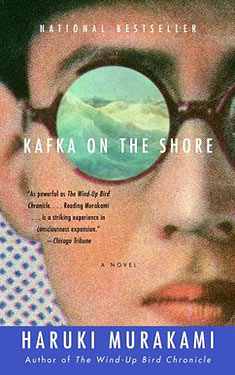Haruki Murakami
Completed 5/2/2023, Reviewed 5/2/2023
5 stars
This novel was a lot less complicated than I thought based on some of the reviews I read. It’s a modern fantasy which takes place in Japan. Not really urban fantasy, it might be thought of as magical realism, or simply, a non-traditional fantasy. It has some elements of Oedipus Rex, plus a simpleton who can talk to cats, and a mythical being that appears as Colonel Sanders. The beginning is a little tough to figure out what’s going on, but it eventually makes sense. It leaves some questions unanswered in the end, but still delivers a satisfying finish. Despite the confusing beginning, I read the second half of this book voraciously. This book won the 2006 World Fantasy Award.
Kafka is a fifteen-year-old boy who runs away from home, leaving his single-parent indifferent father who is a famous sculptor. He makes his way to a distant town, living off some money he stole from his father. He eventually finds himself apprenticing at a private library run by the elusive Miss Saeki and her only librarian, Mr. Oshima. On another plotline, Mr. Nakata is an old simple man who cannot read or write, but he can talk to cats and knows when it’s going to storm, especially if it will rain fish or leeches. After killing a man who has been capturing and beheading stray cats, he tries to tell the police, but they think he is a crazy fool. The next day, he leaves town not really knowing where he’s going because it hasn’t been revealed to him yet. On the way, he meets a benevolent trucker named Hoshino who helps him complete his esoteric mission. Eventually, the two plots intertwine through magic and coincidence without Kafka and Nakata ever meeting.
The story is definitely weird. It’s basically about finding one’s self in a confusing world at a confusing time in life, the teen years. The Kafka narrative is first person. I didn’t really like him at first, but grew to really care about him, worrying about the decisions he was making. He runs away because he gets no warmth from his famous father. His mother left with his older sister when he was four. He doesn’t remember much about her. In fact, when he found his birth certificate, no mother was listed. His father once told Kafka he was cursed to kill him and sleep with his mother and sister. During the course of the story, he seems to fulfill this prophesy, or does he? It’s times like these that you wonder how reliable Kafka is as narrator. Still he’s so endearing and lost that you can’t help come to care for him.
Mr. Nakata is loveable from the start, from the way he expresses himself to his belief in the messages revealed to him. He is so gentle and childlike you just want to take him in and protect him. That’s basically what draws in Hoshino after offering him a ride over a big bridge. Hoshino cares for him like he’s his grandfather, but slowly experiences his own metanoia through knowing and helping Nakata. In fact, Hoshino became my favorite character through the second half of the book. His transformation is fun and tender.
A special note should be made for Oshima. He’s an LGBTQ+ character that becomes a protector and mentor to Kafka. He is warm, gentle, and complicated himself. I don’t want to go into more detail because it gives away some plot elements. But he was my favorite character from the time Kafka meets him until Hoshino begins his transformation.
Based on the three paragraphs above, the characterization and development is simply marvelous, and I didn’t even delve into the female characters, Sakura and Miss Saeki, who are also wonderfully done. The prose is perfect, that is, lovely without being overwhelmingly flowery. The dialogue is realistic, especially for the quirky Kafka, who sometimes sounds like an adult, and sometimes like the kid he still is. And the magic involved is weird, but delightful.
I give this book five stars out of five. I read about two hundred pages through the wee morning hours last night and finished the last seventy before going to work today. I became obsessed with how it was going to all tie together. And I wanted to see what decisions Kafka was going to make. My stomach dropped a few times with some of the twists and turns, and my heart warmed at the end. I guess I had quite the visceral reaction to this book, which is why I gave this excellent book the fifth star.

No comments:
Post a Comment